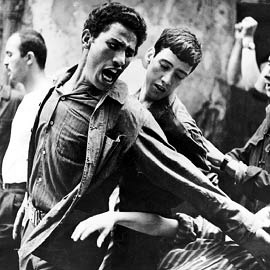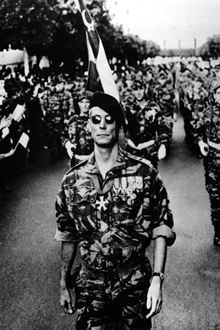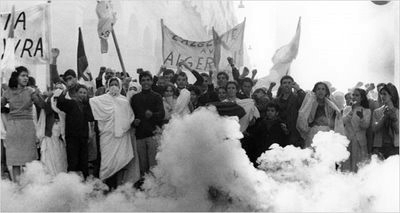
 |
|
|
|
Labeled as "that radical film" upon its early release, Gillo Pontecorvo's The Battle of Algiers gained notoriety as an instruction manual for Communist insurrections. Ten years after 9/11, several films have referenced its once-unthinkable image of female terrorists blowing up innocent civilians to make a political point. Munich, Children of Men and Miral are just three examples from the top of my head. In its time Pontecorvo's movie was the only film around that encouraged viewers to see a colonial struggle from the "other side". But a government security specialist in the extras for this disc says that what happened in Algeria in the 1950s has been happening for 3,000 years. 
Gillo Pontecorvo's prize-winning feature remains an eye-opener, a sprawling epic that looks like an authentic documentary, right down to the grainy film stock and the huge crowds of extras. Although obviously partial to the Algerian underdogs, the filmmakers recount what is basically a gradual Algerian defeat at the hands of the French colonial military. The Algerians won their independence less than five years later, pulling political victory from a tactical failure. France lost because it wanted to hold Algeria as a French enclave where non-Europeans had permanent second-class status. The reaction in France to Algeria's 1962 liberation was for the right-wing OAS to use bombs, bank robberies and assassinations against De Gaulle's government (as dramatized in the excellent thriller The Day of the Jackal). The film shows a prime example of 20th (and 21st) century warfare: a militarily superior force imposing its will in a foreign country that wants its independence. We're shown the absolute ruthlessness of determined Colonials ready to use torture to get what they want. The film also sets forth the credo of Third World defiance that will resort to equal barbarity when no other options are open. Mass murder becomes a political tool to polarize opinion and weaken the enemy's resolve. The unnecessary slaying of innocents on both sides adds to the burden of history. Criterion's extras include authoritative long-form documentaries that address the movie's issues from viewpoints both cinematic and historical. The show begins with a desperate situation in 1957: aided by a ruthless campaign of torture, Col. Mathieu (Jean Martin) succeeds in cornering the final leaders of the FLN (a Nationalist liberation organization) in the Casbah. Flash back to 1954: The struggle for independence begins as FLN commanders organize resistance to French rule and impose strict guidelines on the Algerian populace. When escalating 'terrorist' crimes fail to get official attention from Paris, the French police chief of Algiers jump-starts the rebellion by bombing an apartment block in the Casbah. The French finally respond to warfare on the streets by sending in decorated ex-resistance fighter and military hero Mathieu to clean things up. His paratroops enforce brutal policies to identify, isolate and neutralize the FLN leaders. With the Casbah quarantined, the FLN counters in the only way it can, with a terror campaign of bombs aimed at ordinary French civilians in the European sector. 
In The Battle of Algiers' most famous scene, three Algerian women cut their hair and change from strict Islamic costumes into modern European dresses. They slip through the roadblocks to the European sector and calmly plant timed bombs in a bar, a disco and a street café. A female bomber notes the innocent faces of people who will possibly all be killed, including an adorable French tot licking an ice cream cone. Scores of civilians are blown to bits in each location. A wicked irony plays out -- when the bar down the street is dynamited, the disco patrons step out to see what the commotion is all about. After a couple of seconds of non-interest, they go back inside to dance to more Colombian cumbia music, and are perfectly positioned when their bomb goes off. Our reactions would be all one-sided if it were not for the fact that we've already seen the French dynamite an entire apartment building, killing at least as many innocent Algerians in their beds. In the ensuing rage, the FLN leaps from murders of individual gendarmes to the random machine-gunning of Europeans on the sidewalks. Each escalation is searching for the outrage that will break the spirit of the other side, to show them that resistance is futile. This horror equation was clearly expressed in Apocalypse Now, when Marlon Brando talks about the 'brilliance' of the Viet Cong hacking off the limbs of every village child they found with an inoculation from American medics. The will to resist ends when hearts are broken and one no longer cares who wins. Atrocities are central to human conflict. The Battle of Algiers would be a waste of time if it were a simple adventure story (The Lost Command) or Soviet-style propaganda extolling the FLN. On the contrary, the FLN is shown as a dictatorial faction demanding strict obedience from Algerians. Our 'hero' Ali La Pointe is a Casbah street thug enlisted as an FLN enforcer. He executes shameful Algerian criminals in addition to harassing the French. The FLN did its best to eliminate other anti-French political parties with similar methods, at times executing its own members. The FLN leaders are ideologues bent on ending a 130-year occupation by France, and they're willing to spend an indeterminate number of Algerian lives to get their way. 
Although our allegiance to the underdogs is encouraged, the French are more than fairly treated. The professional Colonel Mathieu knows what his goals are and follows the code of his calling to perfection. It is assumed that he is the kind of French patriot who will later turn renegade when De Gaulle gives the Algerians their independence. The movie is sufficiently skewed to skirt the ugliest extremes of the FLN. The Algerians used torture as well and there were several large massacres of Europeans in the rural action of the war not pictured in the movie. The Battle of Algiers' convincing recreations are so well choreographed that they look like documentary footage. Criterion's original French-titled copy of the film does not use the title card added to the American release, stating proudly that NOT ONE FOOT of documentary stock footage was used in the movie. The paratroops roust the residents of Ali La Pointe's hideout, and our blood runs cold when an actor portraying a soldier accidentally tramples a baby. Cameraman Marcello Gatti keeps things credible with a shrewd use of lenses. Everything is staged but photographed as if caught by a very lucky docu cameraman. The population of the entire Algerian capital seems to have turned out for crowd scenes, and the recreation of the European sector does not criticize or lampoon individual French characters. Of course, all this received predictable reactions in 1966. The Black Panthers and the IRA reportedly took it as a 'handbook' film about setting up a resistance organization. To conservatives it was all the work of the Devil, more historical lies made up by the same godless Communists responsible for every instance of 'non-compliance' to First-World rationality. Algeria stood in for Greece in the 1970 anti-oppression thriller "Z". Greek royalists considered their dictatorship a necessary stopgap to keep the poison of what happened in Algeria from spreading. Director Gillo Pontecorvo was actually the leader in the anti-Fascist resistance in Northern Italy in the last year of the war, and experienced the reality of fighting as an underdog for himself. It's ironic that he was inspired to become a filmmaker by Roberto Rossellini's Paisà, a movie with a chapter about Pontecorvo's wartime battleground in the Po valley. Twenty years later, Pontecorvo directed this movie about the Algerian war, starring and produced by one of the FLN's leaders. 
Ordinary audiences respond enthusiastically to The Battle of Algiers'. It's a great thriller with unusual characters and a lot of action presented far more excitingly than in typical war movies. Interestingly, one of the interviewees giving testimony in the docu extras is a French writer tortured by his own government for supporting the FLN in print. In America, the preferred method of silencing dissent is to ridicule and marginalize writers and critics. Criterion's Blu-ray of The Battle of Algiers retains the unique and valuable content from the 2004 special edition, condensing three DVD discs down to two Blu-rays. Producers Kim Hendrickson and Abbey Lustgarten's long list of features approaches Battle as a piece of political filmmaking, and collects various documents examining how closely it hews to the historical facts. Even neo-cons will be intrigued, as they're well represented by a section with official U.S. Government Counterterrorism executives. Incidentally, these experts' stated solution to fighting 'terrorism' is to win the hearts and minds of local populations over to our superior ideas. The Battle of Algiers was reportedly shown at the Pentagon and the State Department to stimulate creative thinking on how to defeat terrorist organizations. Al-Qaeda is now commonly described in Battle of Algiers jargon, with similar 'terror cell' organizational charts. As is usual at Criterion's high level of editorial care and scrutiny, none of the extras are frivolous or ill considered. The educational value of the set will be appreciated by schools and libraries daring enough to buy a product with the Algerian Moon-and-Star graphic on the cover. It's not a Communist emblem, and the struggle for Algerian independence was not a Communist revolution. The full list of extras is below. I was especially taken with Criterion's self-produced original documentaries. The main pieces on the film's production and the history of the Algerian rebellion are impeccable. Surprisingly, a featurette where contemporary directors comment on the film and director Pontecorvo is also excellent, and contains some good plain-sense opinions about the film's relevance from Spike Lee, Mira Nair, Julian Schnabel, Steven Soderbergh and even Oliver Stone.
On a scale of Excellent, Good, Fair, and Poor,
The Battle of Algiers Blu-ray rates:
Reviews on the Savant main site have additional credits information and are often updated and annotated with reader input and graphics. Also, don't forget the 2011 Savant Wish List. T'was Ever Thus.
Review Staff | About DVD Talk | Newsletter Subscribe | Join DVD Talk Forum |
| ||||||||||||||||||